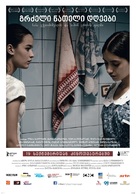Reviews provided by RottenTomatoes
Farran Smith Nehme, New York Post: Where the two directors, Georgia's Nana Ekvtimishvili and Germany's Simon Gross, excel most is in the performances they capture from the two leads. Read more
Joe Morgenstern, Wall Street Journal: This adroit and understated coming-of-age film reminded me of the New Wave of Czech films in the 1960s, but with a distinctive poignancy that translates to wisdom. Read more
Tom Keogh, Seattle Times: The film accurately reflects the girls' numbness, but it is devoid of sustaining emotional impact. Eka and Natia's full pain is oddly remote. Read more
Mike D'Angelo, AV Club: Keenly observed, geographically specific portraits of adolescence are always welcome, but there's definitely something to be said for charging the genre's usual tender lyricism with an ever-present threat of life-altering violence. Read more
Bill Goodykoontz, Arizona Republic: A fascinating snapshot of a country at war with itself (literally, eventually) as seen through the eyes of two teenage girls, whose lives are complicated enough as it is. Read more
Peter Keough, Boston Globe: Despite the seeming inevitability of tragedy and despair, "In Bloom" remains true to its title. Read more
Drew Hunt, Chicago Reader: Directors Nana Ekvtimshvili and Simon Gross adopt the long, contemplative takes of the new wave; much of the film feels familiar, but the location shooting and period details are nicely drawn, a result of Ekvtimshvili's autobiographical script. Read more
Peter Rainer, Christian Science Monitor: It's a universal story that is also, by virtue of its very particular time and place, a singular experience. Read more
Tom Long, Detroit News: The world painted by directors Nana Ekvtimishvili and Simon GroB is almost relentlessly grim, and even the giggles of two schoolgirls get drowned. Read more
Stephen Dalton, Hollywood Reporter: First-time writer-director revisits her bittersweet Tblisi childhood. Read more
Betsy Sharkey, Los Angeles Times: The excellent new drama In Bloom, Georgia's Oscar entry in the foreign-language category, has the heartbreak and hope of a country slipped inside a coming-of age-story of two 14-year-old girls. Read more
Tomas Hachard, NPR: The double meaning becomes clear early on. What takes longer to recognize is the title's bitter irony. Read more
A.O. Scott, New York Times: It matter-of-factly lays out the predicaments of its characters, balancing a strong, implicit feminist sensibility with a sympathetic sense of the power of tradition. Read more
Michael Sragow, Orange County Register: This haunting coming-of-age film is set in a country that itself is coming of age. Read more
Cath Clarke, Time Out: As arthouse coming-of-age films go, this is brilliant -- smart and sensitive with a screw-you feminist streak. Read more
Joshua Rothkopf, Time Out: Girls become women as the nation of Georgia awkwardly tries on its own independence in this sluggish period piece, set in post-Soviet 1992 and alternating earnest emotions and a stunted plot. Read more
Calum Marsh, Village Voice: The site of the action, the pummeled landscape of revolution and war, isn't incidental -- it's what their generation has inherited, alongside disorder and dissent. Read more
Bilge Ebiri, New York Magazine/Vulture: The directors stay close on their characters and let scenes play out in handheld long takes, so that the miseries inflicted never feel distant or clinical, but immediate. Read more
Stephanie Merry, Washington Post: The viewer becomes keenly aware that she is only getting part of the story. But when the truth is so troubling, sometimes part of the story is more than enough. Read more

